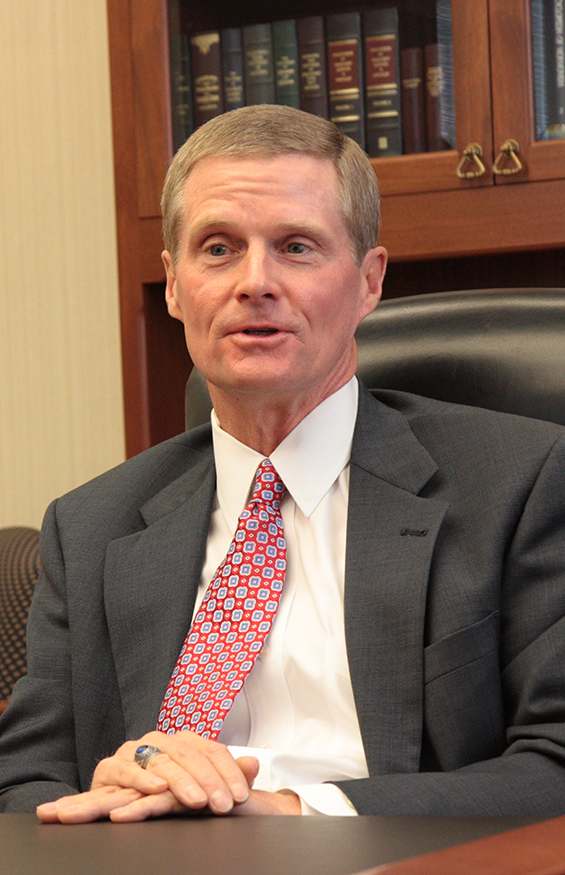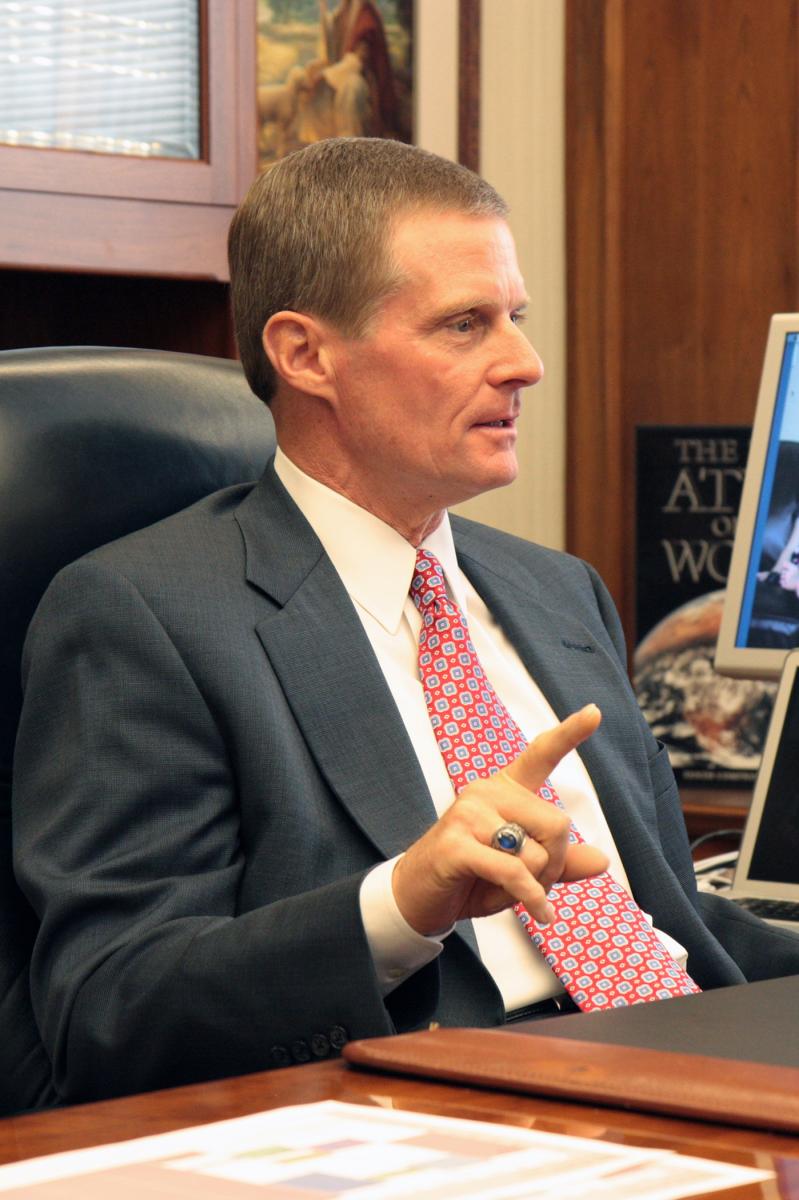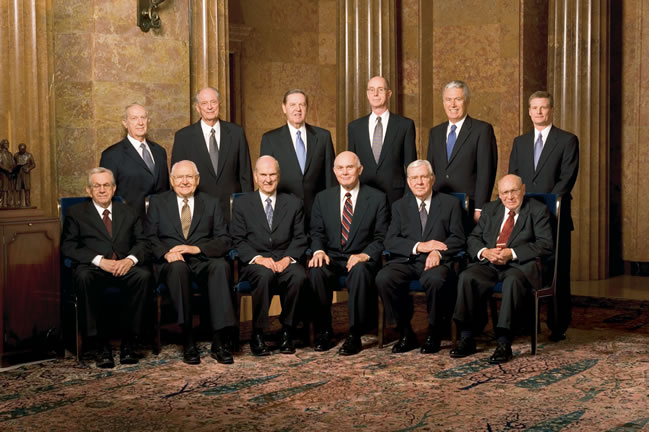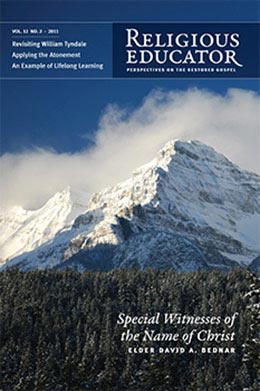Special Witnesses of the Name of Christ
David A. Bednar
Elder David A. Bednar, "Special Witnesses of the Name of Christ," Religious Educator 12, no. 2 (2011): 1–11.
Elder David A. Bednar was a member of the Quorum of the Twelve Apostles when this was written.
 Elder David A. Bednar. Photo by Brent R. Nordgren.
Elder David A. Bednar. Photo by Brent R. Nordgren.
Religious Educator (RE): Elder Bednar, what does it mean to you to be a special witness of the name of Christ in all the world?` (see D&C 107:23)
Elder Bednar: The role of an Apostle today is the same as it was anciently (see Acts 1:22; 4:33). Our commission is to go into all the world and proclaim “Jesus Christ, and him crucified” (see Mark 16:15, 1 Corinthians 2:2). An Apostle is a missionary and a special witness of the name of Christ. The “name of Christ” refers to the totality of the Savior’s mission, death, and resurrection—His authority, His doctrine, and His unique qualifications as the Son of God to be our Redeemer and our Savior. As special witnesses of the name of Christ, we bear testimony of the reality, divinity, and resurrection of Jesus Christ, His infinite and eternal Atonement, and His gospel.
RE: What does it mean to you personally to be called to be an Apostle?
Elder Bednar: We learn in the Bible that the ancient Apostles received the keys of the kingdom (see Matthew 16:15–19; 18:18). Work at every level in the Church is directed through priesthood keys. Priesthood leaders are called and set apart “by the laying on of hands by those who are in authority” (Articles of Faith 1:5) and receive keys to direct the Lord’s work, whether they be a deacons quorum or elders quorum president, a bishop or a stake president. Today, fifteen living men—the First Presidency and Quorum of the Twelve—each individually hold the keys necessary to direct the Lord’s work in all the earth. However, only the senior Apostle, the President of the Church, is authorized to exercise all priesthood keys.
It is not because of our background, experience, or capacity that we have been called to these positions. The ancient Apostles were common men—and that was an important part of their qualification to serve. It had to be the Lord’s work because, given the magnitude and majesty of the responsibility, it could not have been accomplished through mere physicians, tax collectors, tentmakers, and fishermen. The same is true today. We are ordinary men, and this work cannot prosper because of any capacities that we may have. It is the Lord’s work, it is His restored Church, and we rely on His direction.
President Boyd K. Packer and I were talking one day when he made a most helpful observation. He said the longer one serves as a member of the Twelve, the weightier the mantle becomes and the more overwhelmed you feel. I think this truth also applies to all Church callings. The longer I serve, the more I see and understand the weight of the calling. Consequently, the responsibility drives me to my knees and requires me to rely upon heavenly help instead of the arm of flesh.
RE: And perhaps part of magnifying a calling is beginning to see aspects of it that you had not seen before. What have you learned about your role as an Apostle that has been clarified through experience?
Elder Bednar: I have learned that the ministry of an Apostle is to find the one. Many people inside and outside of the Church may believe the primary role of members of the Quorum of the Twelve is to speak in general conference or preside in large meetings. And certainly we do those things. But when assigned to a particular conference in a specific location, I know I am there not only because of the assignment but also to find the one. The keys of the priesthood are sent to bless individuals. I am not using bless in a limited sense of only “hands on the head.” The keys and the apostolic authority are sent by the Lord to a specific place to bless individuals and families.
RE: What has been, or is, for you one of the most difficult things about the transition from being the president of Brigham Young University–Idaho and an Area Seventy to being an Apostle?
Elder Bednar: To have spent my entire adult life learning from stalwart Brethren, individuals who have been my spiritual heroes and mentors—President Gordon B. Hinckley, President Thomas S. Monson, President James E. Faust, President Boyd K. Packer—and then one day find myself sitting in council with them in the same room is beyond description. There was no formal orientation, just an expectation to act, to participate, and to render judgment as if I had always been there. The change from sitting in the audience in general conference to sitting on the stand among the Brethren is overwhelming and indescribable.
RE: When you look at the Brethren—each with a separate personality, distinguishing strengths, backgrounds, educations, training—can you shed some light about how unity is achieved on difficult questions?
Elder Bednar: In the presiding councils of the Church, ego and self-centeredness are absent. No one is concerned about being right or receiving recognition; everyone simply wants to get it right, whatever the issue. One can participate in those councils fully and without apprehension because the focus is on discerning the will and timing of the Lord and moving forward the work of the kingdom. When proposals are presented or ideas discussed, it is not abrupt; it is direct. It is not harsh; it is bold. With unity in purpose and absence of personal agendas, the council can get to the heart of an issue and have candid conversations that invite the Spirit of the Lord. It is remarkable.
 "I have learned that the ministry of an Apostle is to find the one....When assigned to a particular conference in a specific location, I know I am there not only because of the assignment but also to find the one." Photo by Brent R. Nordgren.
"I have learned that the ministry of an Apostle is to find the one....When assigned to a particular conference in a specific location, I know I am there not only because of the assignment but also to find the one." Photo by Brent R. Nordgren.
RE: What is the role of seniority in the Quorum of the Twelve, as you see it? How do you balance the two supposedly at-odds ideas of having not only the right but the responsibility to speak up and contribute, with the ever-present matter of seniority as an important principle?
Elder Bednar: Seniority is key, but the senior Brethren employ patterns that invite those who are junior to actively and completely participate in councils. Everyone is invited and expected to express opinions and share observations. For example, when I was the junior member, I frequently would be called upon to speak first in meetings of the Council of the First Presidency and the Quorum of the Twelve. When an Apostle who has served decades longer than I speaks first, I certainly am willing to express a different perspective or propose an alternative course of action, but I would be foolish not to recognize that he knows much more than I do about the matter before the council. I might, therefore, be strongly influenced by his opinion; thus the presiding officer often chooses not to call on a senior member to speak first. By using that simple pattern in council, all can be edified of all.
RE: If you were to use the apostleship as a pattern for Latter-day Saints in general, in terms of their faith, testimony, spiritual growth, and closeness to the Savior, what do you envision?
Elder Bednar: Many people may consider the leaders of the Church to be dramatically different somehow—no physical ailments, no family challenges; totally smooth, wonderful lives. The Brethren are not exempted from hardships and difficulties. There is opposition in all things for everyone.
Some people also may imagine that Church leaders obtain revelation in ways that are fundamentally different from others—receiving direct, immediate, and specific answers, and then going forward easily to lead and do what is required. The true pattern for leaders and for members basically is the same—pressing steadfastly forward with faith in the Lord Jesus Christ—and as one does so, guidance and answers typically come “line upon line, precept upon precept, here a little and there a little” (2 Nephi 28:30).
Remember, Nephi went to Jerusalem to obtain the plates of brass not knowing beforehand the things that he should do (see 1 Nephi 4:6). Following the example of Nephi and the leaders of the Church, it is requisite that members face the complex, demanding challenges in the world today, always striving to do their very best. President Hinckley counseled, “If you do your best, it will all work out” (Ensign, October 2000, 73). That is the pattern. Summarized in my own words: “Be good, honor your covenants, keep the commandments, and your steps will be guided, your utterances will be inspired, yet the majority of the time you will not necessarily know in the moment that you are being guided and inspired.”
RE: President Packer has taught, “Do not take counsel from your fears” (Brigham Young University commencement, April 1994). Have you seen this principle illustrated among the leading elders of the Church?
Elder Bednar: Yes, repeatedly. While serving as president of BYU–Idaho, I attended a Church Board of Education meeting in Salt Lake City on the day following the September 11 terrorist attack. I anticipated the Brethren would highlight the horrific event that had taken place. President Hinckley entered the room, sat down, and said, “Brothers and sisters, we live in troubled times. Now, let’s get to work.”
There is a remarkable lesson in that episode. There was no hand-wringing, no commiserating. This is the Lord’s work, and “no unhallowed hand can stop [this] work from progressing” (History of the Church, 4:540). It is going to prevail, and the leaders know that. I am not suggesting that they obliviously ignore current events. They are well informed and astutely attuned to what is taking place in the world. But this is the Lord’s work. With the clear understanding and certain knowledge that He is in charge, there is no fear.
RE: How has your present calling in any way affected your scripture study?
Elder Bednar: President J. Reuben Clark taught that a special endowment of power comes to those who are sustained as prophets, seers, and revelators. I still read the scriptures chronologically, study by topic, and search for patterns, but I have had remarkable experiences wherein a power beyond my own has helped me. I still must ask, seek, and knock, but the Spirit of the Lord unquestionably has helped me discern connections that I previously had not seen.
RE: Do you perceive apostolic principles when you read something that clearly pertains to you as an Apostle?
Elder Bednar: Certainly. A number of sections in the Doctrine and Covenants contain specific instructions to the Twelve. I read and comprehend those instructions quite differently now. And as I read in 3 Nephi about the Savior’s disciples on the American continent, the instructions they received, and how they responded, I marvel at the change in my perception and understanding. I see with new eyes.
RE: How would you describe the relationship between the Council of the Twelve and the Council of the First Presidency?
Elder Bednar: They are one in purpose and performance. Fifteen Apostles, the senior Apostle presiding in the Quorum of the First Presidency, the Twelve serving under the direction of the First Presidency, and the First Presidency counseling with the Twelve—these quorums are one in heart, one in mind, and certainly one in purpose. When you hear the Brethren say that we are one and that we are more united than ever before in the history of the Church, it is true.
The First Presidency presides. The Twelve would not overstep the bounds of their respective authority. Yet the First Presidency would almost always seek the counsel of and input from the Twelve. Thus the Twelve would never seek to impose a point of view or decision, and the First Presidency would invite the views of the Twelve. This aspect of our interaction is quite remarkable.
 Elder Bednar was sustained as a member of the Quorum of the Twelve on October 2, 2004. ©2004 Intellectual Reserve, Inc.
Elder Bednar was sustained as a member of the Quorum of the Twelve on October 2, 2004. ©2004 Intellectual Reserve, Inc.
RE: You sit in meetings with those Brethren. What are one or two other things you have learned from watching the dynamics of the Twelve?
Elder Bednar: I have had the opportunity many times to observe the Lord’s patterns of revelation. In my judgment, the most prevalent pattern is line upon line, precept upon precept. In meetings, different members of the council make observations that contribute incrementally to an ultimate decision or solution. Rarely is an issue ever introduced, discussed, and resolved in only one meeting. Not only does each person contribute line upon line in a specific meeting but across multiple meetings. In each successive council session, elements are added to the totality that could not have come in a previous session.
RE: So unity comes in process of time.
Elder Bednar: As we each individually ponder and pray and then continue to counsel together under the direction of the Spirit, we are benefitted by the perspective and inspiration of everyone in the council. We take the next step forward and then another step. As long as our feet are moving and we are pressing forward, the way is always illuminated.
RE: In your view, what are a few of the most significant challenges the Church faces today?
Elder Bednar: I believe the answer depends on where you are in the world. I would suggest that in the developing Church the challenges are (1) keeping the doctrine simple and pure and (2) helping people develop spiritual strength and leadership for their homes and in the Church.
In areas where the Church has existed for a long time—the developed Church—the challenges are (1) spiritual apathy and (2) false traditions—practices incorporated into the culture of the Church that are erroneously considered to be part of the doctrine or authorized practice.
RE: In your view, how do we balance the challenge to standardize the Church across the world with maintaining the same kind of spiritual spontaneity that characterized the early Latter-day Saints?
Elder Bednar: There is a continuum, if you will, with uniformity at one end and adaptability on the other. There are doctrines and ordinances and practices that must be uniform everywhere; there is no room for deviation. The sacrament prayers are not offered differently in various countries or cultures. The Lord has given clear guidance that this ordinance is to be uniform.
In other matters, room exists for local adaptation based upon needs and circumstances. One example would be the ability of local priesthood leaders, with the approval of the Area Presidency, to use the Basic Unit Program of the Church where the number of members is small and leadership is just beginning to develop. Also, Handbook 2: Administering the Church provides additional guidance in chapter 17 about appropriate adaptations.
RE: There seems to be a growing secularity in the world, secularization of cultures, particularly in Europe. In this country or other countries, how do we engage the secular world? We have a world where fewer and fewer people care about religion. Do we do anything differently?
Elder Bednar: Our responsibility is to bear authoritative witness of the living reality and divinity of Jesus Christ, with love and boldness to all the world. We should love and live the gospel, becoming an example of the believers and a light to the world.
There are pervasive misunderstandings about the Church and our beliefs, perhaps more so in secularized areas of the world. I think we must recognize how widespread those misunderstandings are. We do not ignore these challenges, but we also do not spend all our time responding to critics or attacks.
Misunderstandings are a barrier to honest seekers of truth learning about the restored gospel and asking in faith with a sincere heart and real intent to know of its truthfulness. The power of our example in relatively routine daily activities can help those not of our faith overcome common misunderstandings as a preparation to receive the word and exercise faith.
RE: Because people feel the need for something deep and—
Elder Bednar: There is an emptiness, a hollowness to the things only the world can provide. Because of the Light of Christ, all of God’s children resonate with the truth that we are sons and daughters of God. Divine truth will not be overruled by secular philosophy.
RE: It seems that the Lord probably compensates honest seekers of truth in terms of their depth, their strength, perhaps more so than those who have life much easier.
Elder Bednar: I have been to countries where the people were indoctrinated for generations that God did not exist, yet they believed in God. Looking into the faces of those people, I witnessed truly remarkable changes as they learned restored truth about Christ and His Atonement—and about faith and hope because of Him.
For example, I was involved in the final phases of obtaining legal recognition of the Church in Slovakia. My work in that country enabled me to meet and visit with a sister living in a small city in Slovakia who was baptized in the late 1930s.
As a young girl she said to her parents, “I want to be baptized.” Because it was winter and she would have to be baptized in a frozen river, they suggested waiting until spring. Determined, she said, “I have to be baptized on my birthday.” Finally, the parents agreed, and she was baptized. Shortly thereafter, the missionaries were taken out of her country after Hitler’s armed forces invaded. Had this young sister not insisted on being baptized at that particular time, she would not have had the opportunity until more than fifty years later.
I was in her home—an old, cramped, communist apartment—decorated with beautiful gospel paintings on the walls. A family friend had painted these portraits from 1940 era postcards of Temple Square and Church landmarks. Her modest apartment was filled with inspiring artwork. I saw the light and felt the power of the gospel in the modest home of this sister. I believe that in a crowd of one hundred or even one thousand people from the same area of that country, you would immediately identify this sister, because the light of the gospel radiates in her countenance.
RE: The Religious Educator is a journal devoted principally to teachers within the Church. What counsel do you have for the teachers of the Church?
Elder Bednar: In this day, it is imperative to help students more fully understand the Father’s plan, to act as agents, and to exercise their agency righteously.
Parents and teachers need to do much more with young people than say, essentially, “Sit down and pay attention while we tell you what you need to know.” Parents and leaders should become guides who help young people learn how to find answers for themselves. Youth need to act as agents and properly exercise their agency in order to obtain and retain a strong testimony and to become converted—instead of primarily depending spiritually upon someone else. We cannot borrow from another person what is necessary “to stand as witnesses of God at all times, and in all things, and in all places” (Mosiah 18:9). With multitudes of secular influences trying to counteract the truth about and from God, no one can thrive by attempting to borrow light from the spiritual lamps of other people.
The role of a teacher is to invite a learner to act in accordance with the truth taught by the Savior. As teachers, we cannot push truth into the hearts of young people. Our best efforts can only bring the message of truth unto the heart (see 2 Nephi 33:1). Ultimately, a learner needs to exercise agency in righteousness and thereby invite the truth into the heart.
RE: Many of those who read the Religious Educator will have students or acquaintances, maybe even loved ones, who are wrestling with their faith or with their testimony or have encountered some opposition to the Church. How would you counsel teachers in terms of how to help those who are struggling?
Elder Bednar: The Apostle Paul declared that in the dispensation of the fulness of times, all things would be gathered together in one, in Christ (see Ephesians 1:10; D&C 27:13). All truth from previous dispensations will be restored in this dispensation, and new truth has been and will yet be revealed (see D&C 121:26–27; 124:41; 128:18).
Some individuals may wrestle with their faith or testimony, for example, because of concerns about episodes in Church history or because of unpleasant interactions with priesthood and auxiliary leaders. I believe the answer is to consider those historical events and interpersonal experiences in the totality of all things gathered together in one—and not allow an incident about which we may not or cannot know the complete context or an uncertainty to obscure the view of the comprehensive majesty of this work.
Consider that as a young man Joseph Smith was an instrument in God’s hands through whom hundreds of pages of new scripture were brought forth, the Savior’s church was restored, priesthood authority and keys were returned to the earth, and saving ordinances and covenants were reestablished. Could such spiritual truth come from one individual, endure to this day, and grow and prosper throughout the world unless it was accomplished under the direction of the Lord? I do not believe so.
To dwell upon certain historical episodes, about which some of the details perhaps are unknown, unrecorded, or unknowable, and become blinded to all of the truths gathered together in one, in Christ, in these latter days is unwise. Likewise, to focus upon human frailties so evident in all of us also is injudicious. I am not suggesting that we summarily dismiss or ignore challenging aspects of Church history or condone inappropriate behavior. Rather, I am recommending we look at the larger gospel perspective for greater context and deeper understanding.
RE: So it’s the principle that the whole is far greater than the sum of the parts.
Elder Bednar: All of the parts are “fitly framed together” (see Ephesians 2:19–21). My hope, especially for people who are troubled by such occurrences, is that they will ask themselves this question: “Am I willing to set aside or lose the entirety of restored truth because of historical events about which we may not know all of the relevant information or because of awkward experiences with other Church members?” To judge wisely, consider the entirety of the gospel of Jesus Christ—all of the truths revealed in the dispensation of the fulness of times.
RE: Is there anything else you would like to share with us?
Elder Bednar: I would like to express how much the leaders of the Church love you faithful teachers for your work in bearing witness of the divinity of Christ and helping students learn His doctrines. You have the privilege to assist others in coming unto Christ and to experience an ever-deepening conversion. We recognize that helping students learn is a joy for you as religious educators; it is also the ultimate service you can offer. We love, appreciate, sustain, and support you in all you are doing in righteousness.
